The Prophet’s Methods of Correcting People’s Mistakes by Muhammad Salih al-Munajjid
The Prophet’s Methods of Correcting People’s Mistakes by Muhammad Salih al-Munajjid
Publisher:
IIPH (International Islamic Publishing House)
Author:
Muhammad Salih al-Munajjid
Language:
English
Binding:
Hard Cover
Pages: 176
Size: 8.6 x 6.1 x 0.4 inches
Couldn't load pickup availability
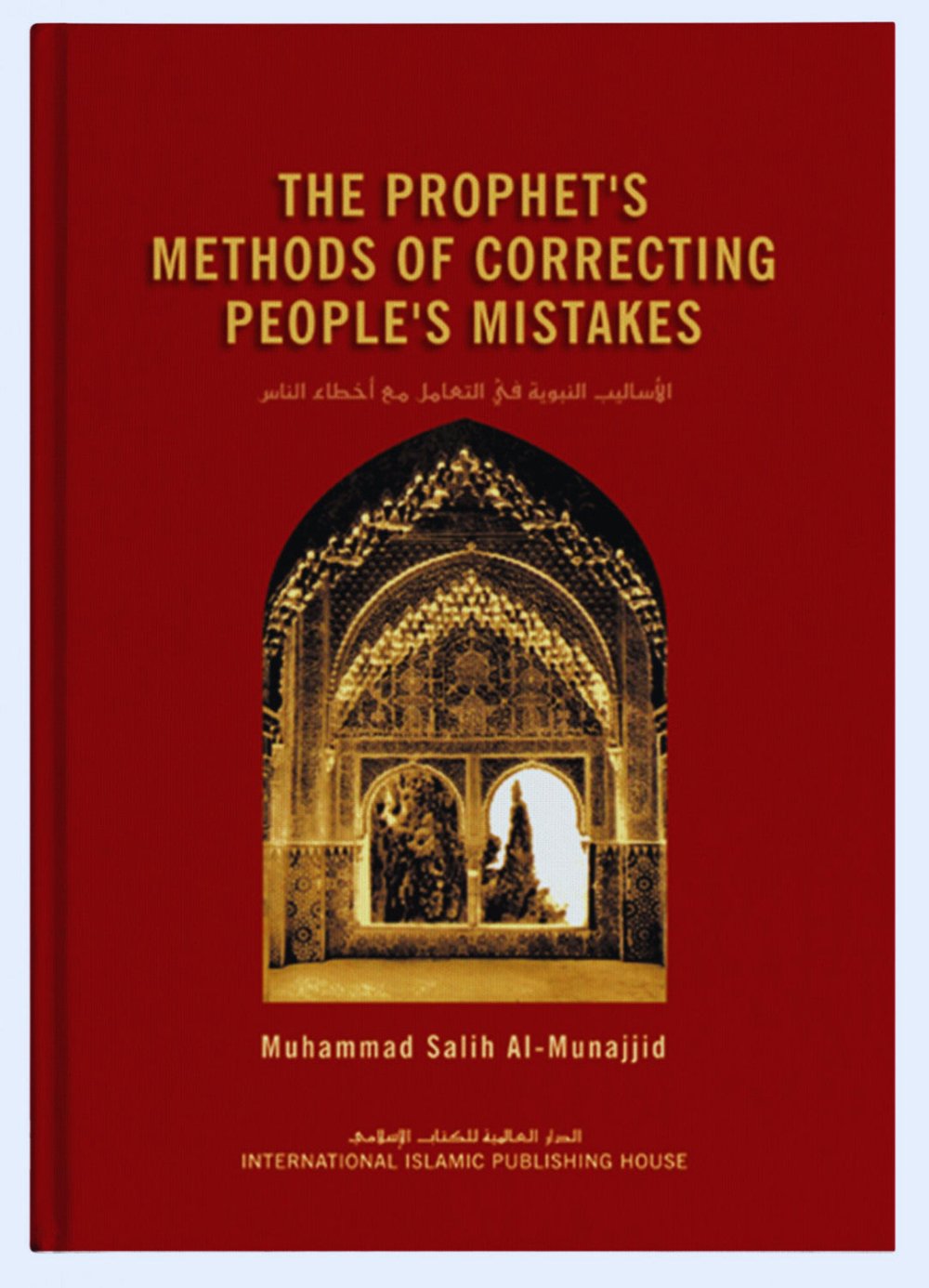
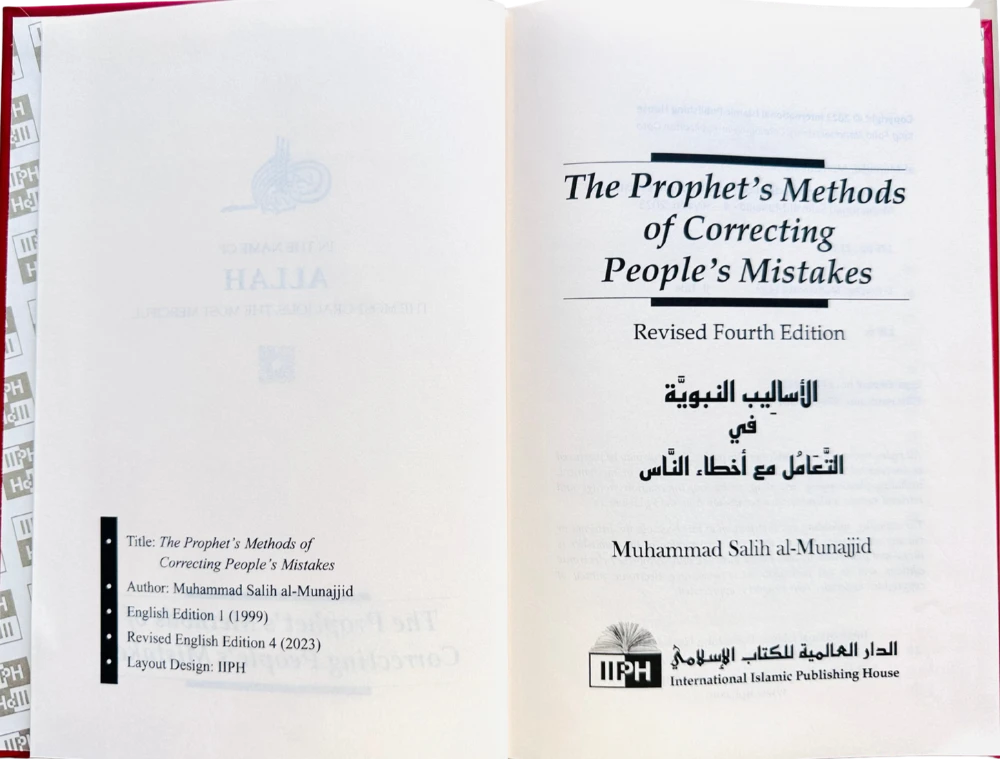
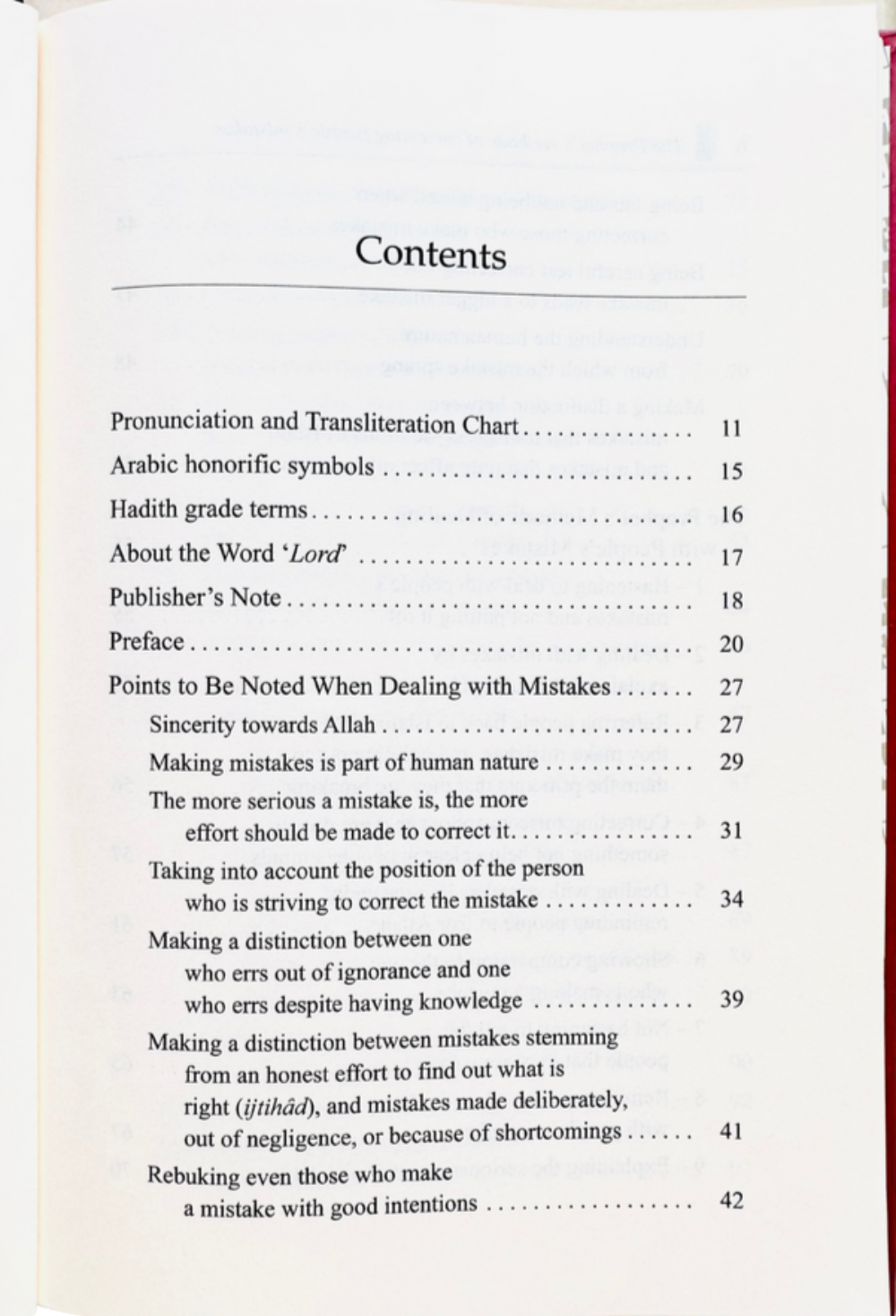
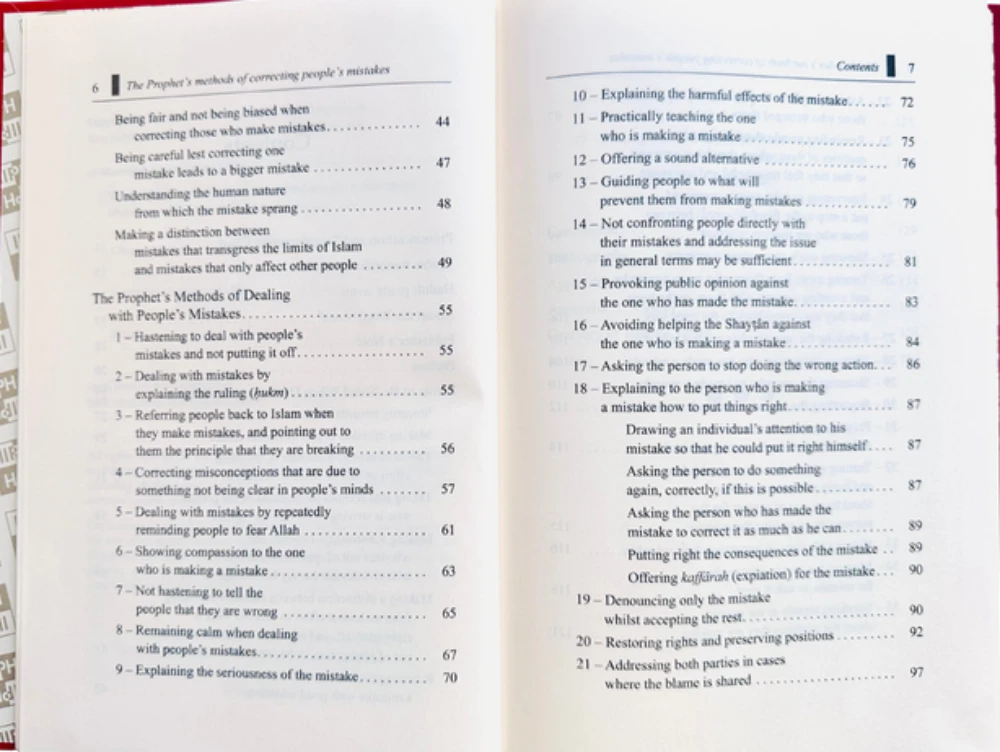
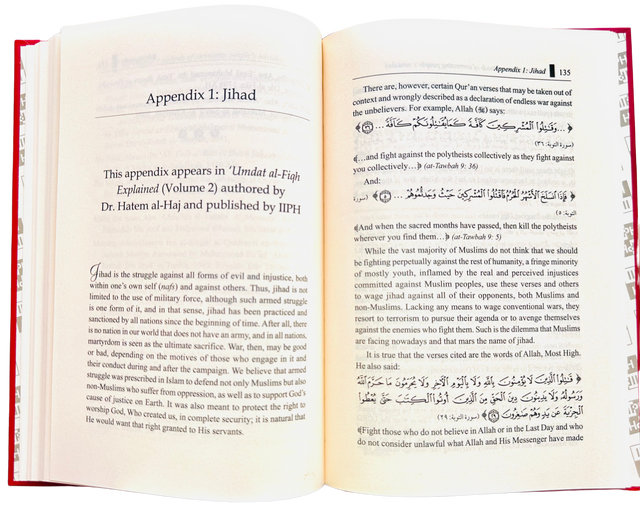
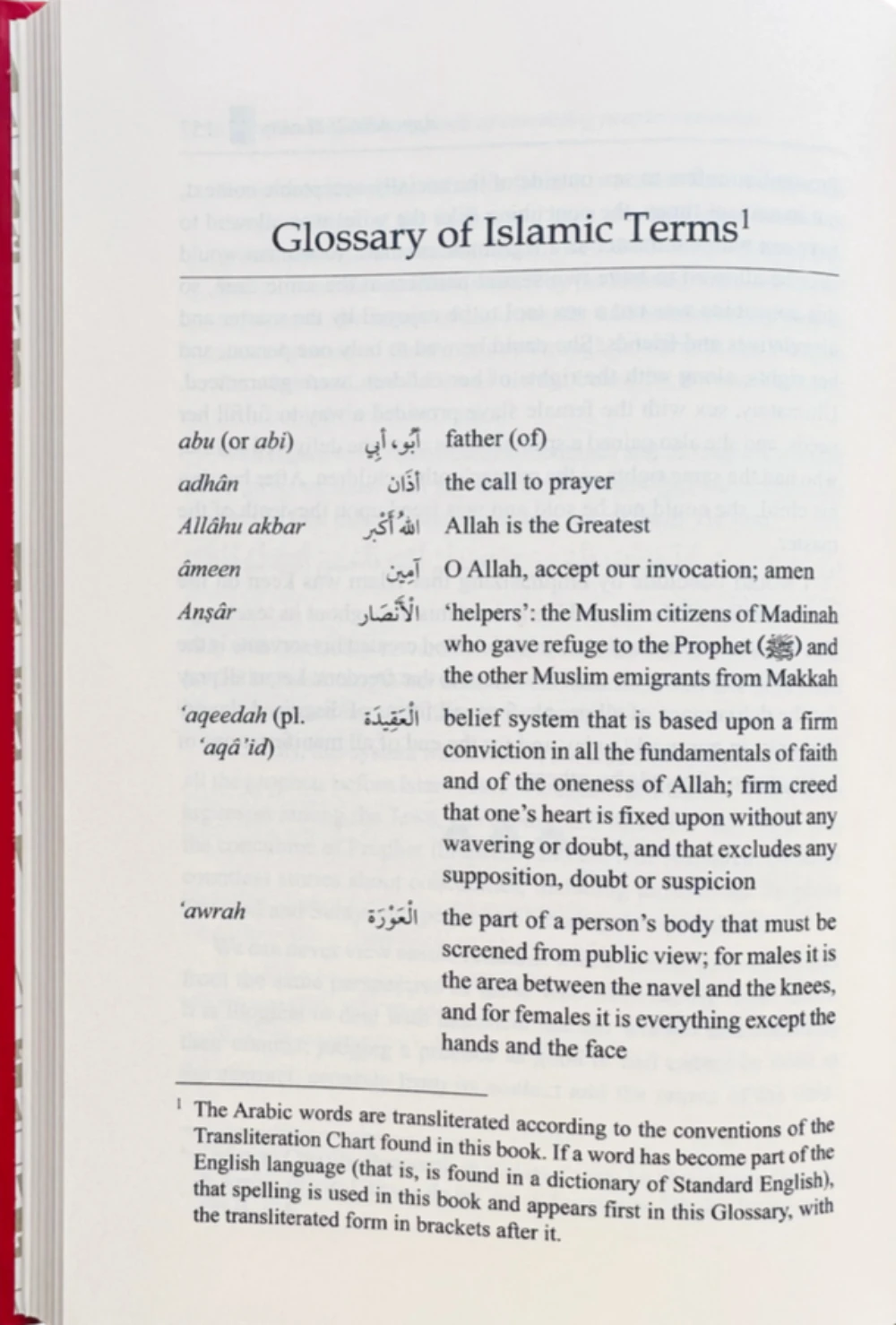
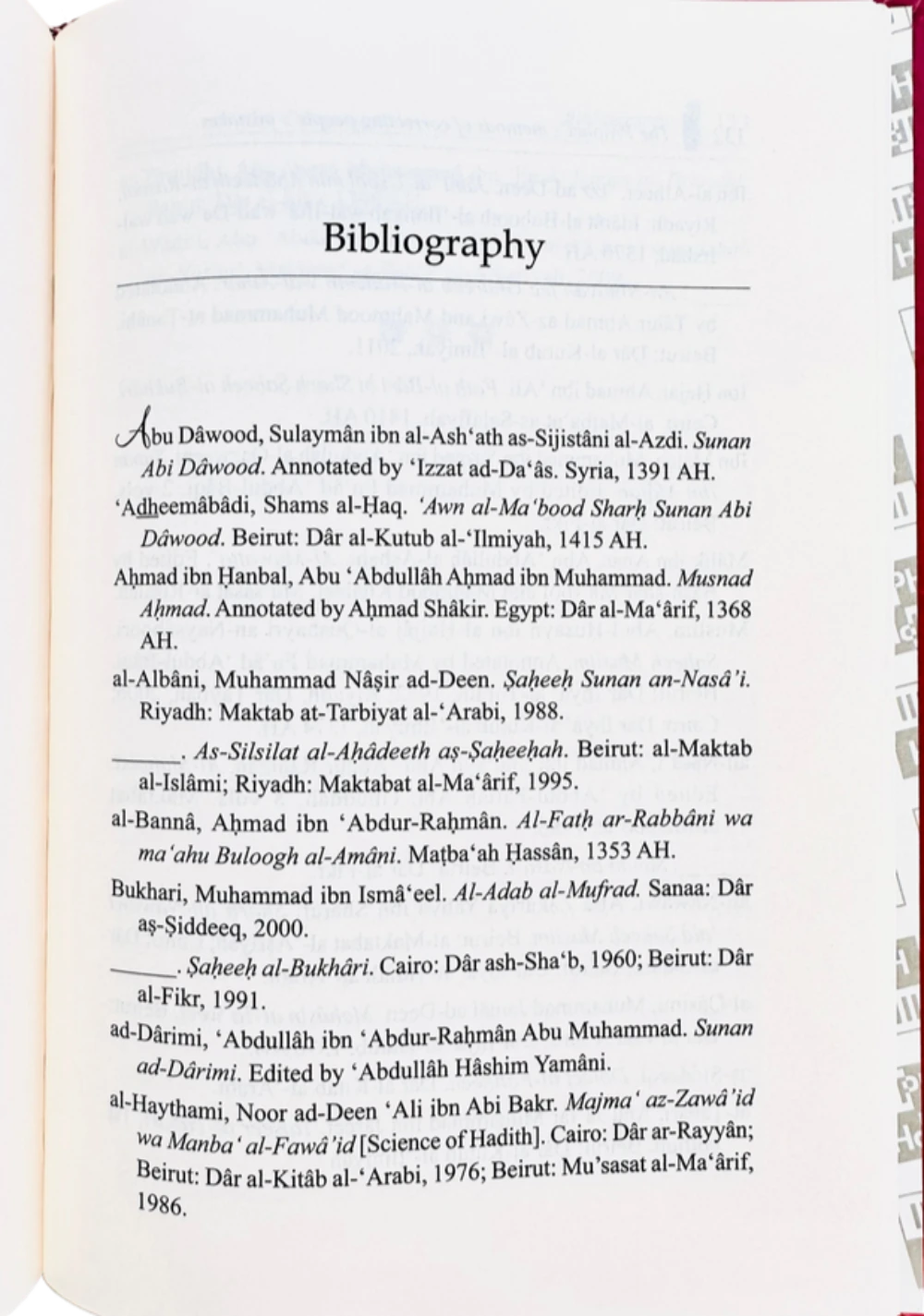
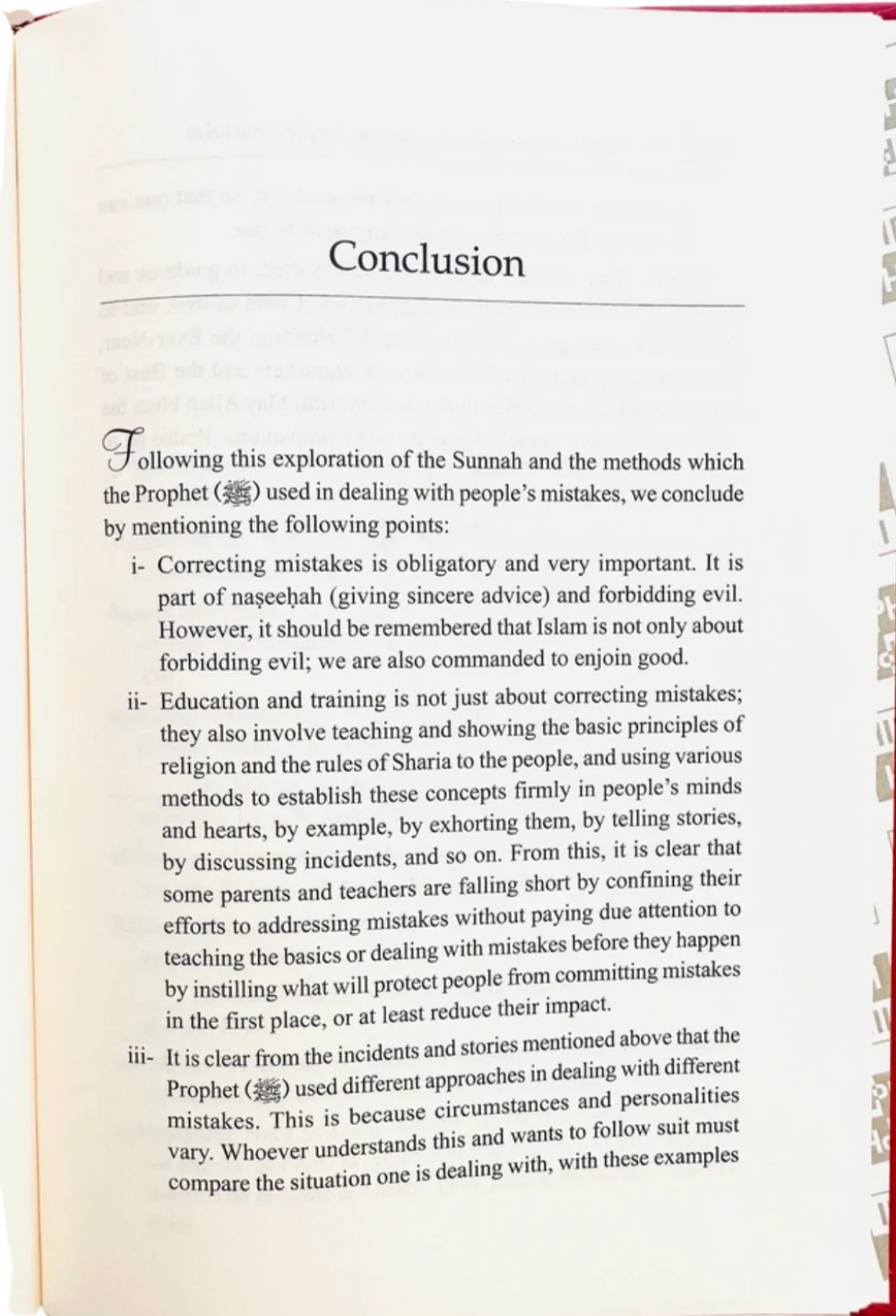
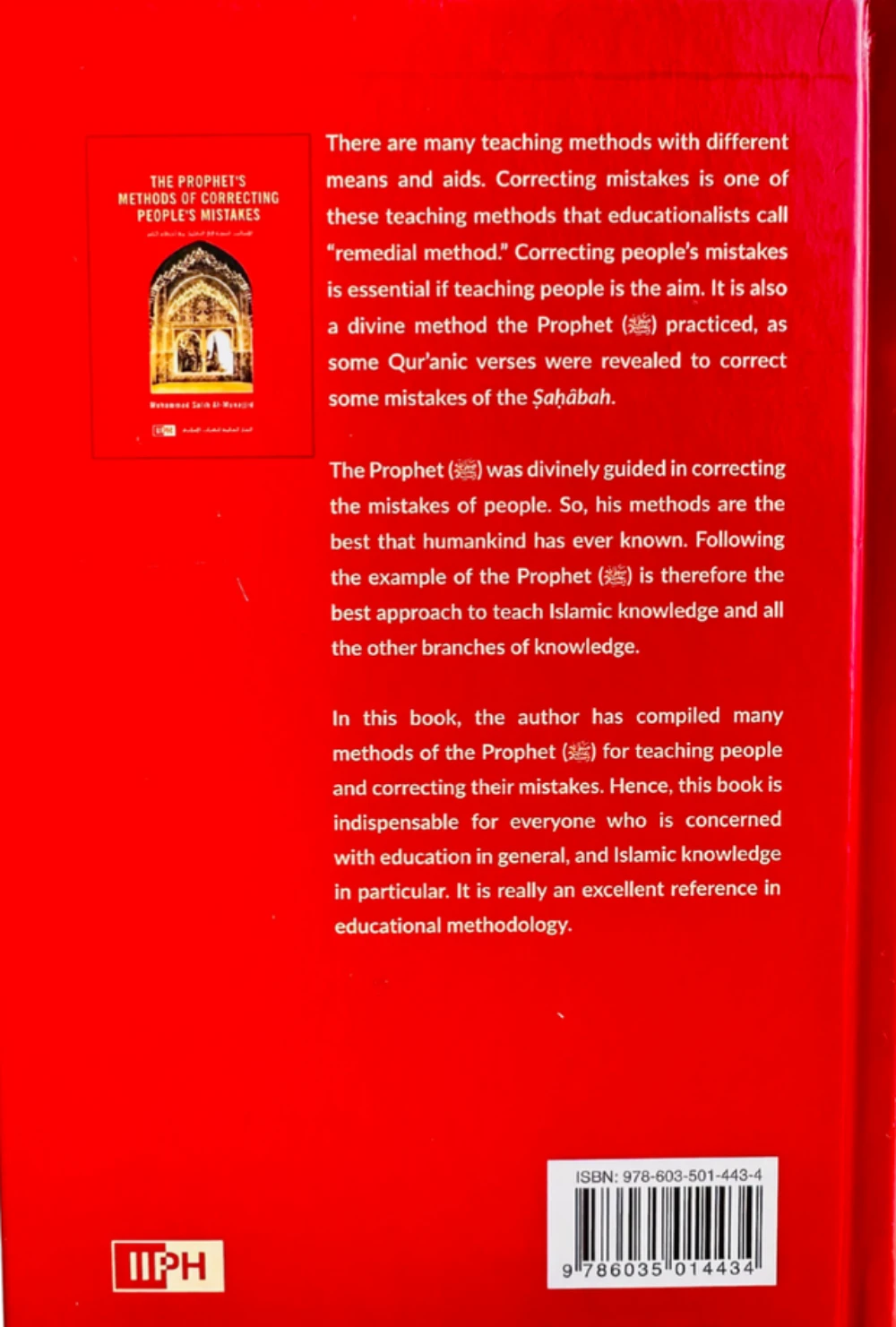
Collapsible content
Description of Book
The Prophet’s Methods of Correcting People’s Mistakes by Muhammad Salih al-Munajjid
Immerse yourself in the timeless wisdom of the Prophet Muhammad (peace and blessings be upon him) and transform your approach to education and guidance. This journey explores the Prophet’s extraordinary ability to address mistakes with profound compassion, wisdom, and skill, offering lessons for educators, leaders, and anyone striving to inspire positive change. By studying his examples, you will uncover the principles of divine guidance, effective communication, and transformative teaching, empowering you to correct errors and guide others with empathy and insight. Become an expert in uplifting and nurturing those around you, following the most exemplary method ever demonstrated.
Publisher
IIPH (International Islamic Publishing House)
Author
- Muhammad Salih al-Munajjid
Sample Pages - Content
Page:01
THE PROPHET'S METHODS OF CORRECTING PEOPLE'S MISTAKES
الأساليب النبوية في التعامل مع أخطاء الناس
Muhammad Salih Al-Munajjid
الجدار العالمية للكتاب الإسلامي
INTERNATIONAL ISLAMIC PUBLISHING HOUSE
Page:02
PH
H
IPH Hd
dll
IPH Hd
HAJJA
PH
Adil
ПР
Title: The Prophet's Methods of Correcting People's Mistakes
Author: Muhammad Salih al-Munajjid English Edition 1 (1999)
Revised English Edition 4 (2023) Layout Design: IIPH
The Prophet's Methods of Correcting People's Mistakes
Revised Fourth Edition
الأساليب النبوية في التعامل مع أخطاء النَّاس
Muhammad Salih al-Munajjid
IIPH
الدار العالمية للكتاب الإسلامي
International Islamic Publishing House
Page:03
Contents
Pronunciation and Transliteration Chart..
Arabic honorific symbols...
Hadith grade terms...
About the Word 'Lord'
Publisher's Note.......
Preface....
11
15
16
17
18
20
Points to Be Noted When Dealing with Mistakes....... 27
Sincerity towards Allah....
Making mistakes is part of human nature
The more serious a mistake is, the more
effort should be made to correct it...
Taking into account the position of the person
who is striving to correct the mistake..
22226
27
29
... 31
34
Making a distinction between one
who errs out of ignorance and one
who errs despite having knowledge
39
Making a distinction between mistakes stemming from an honest effort to find out what is
right (ijtihad), and mistakes made deliberately,
out of negligence, or because of shortcomings...... 41
Rebuking even those who make
a mistake with good intentions
42
Page:04
The Prophet's methods of correcting people's mistakes
Being fair and not being biased when
correcting those who make mistakes...
Being careful lest correcting one
mistake leads to a bigger mistake
Contents 7
44
47
Understanding the human nature
from which the mistake sprang .
48
Making a distinction between
mistakes that transgress the limits of Islam
and mistakes that only affect other people
49
The Prophet's Methods of Dealing
with People's Mistakes.
55
1-Hastening to deal with people's
mistakes and not putting it off.
55
2-Dealing with mistakes by
explaining the ruling (bukm).
55
3-Referring people back to Islam when they make mistakes, and pointing out to them the principle that they are breaking
10-Explaining the harmful effects of the mistake...... 72
11- Practically teaching the one who is making a mistake
12-Offering a sound alternative 13-Guiding people to what will
prevent them from making mistakes 14- Not confronting people directly with their mistakes and addressing the issue in general terms may be sufficient. 15- Provoking public opinion against the one who has made the mistake.. 16- Avoiding helping the Shaytan against the one who is making a mistake... 17-Asking the person to stop doing the wrong action. 18 Explaining to the person who is making
a mistake how to put things right...
75
76
79
81
డి.
83
84
22
86
87
Drawing an individual's attention to his
56
mistake so that he could put it right himself.... 87
4-Correcting misconceptions that are due to something not being clear in people's minds
Asking the person to do something
57
again, correctly, if this is possible..
87
5-Dealing with mistakes by repeatedly
reminding people to fear Allah
6- Showing compassion to
who is making a mistake.
Asking the person who has made the
61
mistake to correct it as much as he can.
the one
611
Putting right the consequences of the mistake..
63
65
7-Not hastening to tell the
people that they are wrong
8- Remaining calm when dealing
with people's mistakes.
67
9- Explaining the seriousness of the mistake..
21-Addressing both parties in cases
70
where the blame is shared.
Offering kaffärah (expiation) for the mistake... 19-Denouncing only the mistake
whilst accepting the rest..
20-Restoring rights and preserving positions.
Page:05
Appendix 1: Jihad
Appendix 1: had 135
There are, however, certain Qur'an verses that may be taken out of context and wrongly described as a declaration of endless war against the unbelievers. For example, Allah (54) says:
.. وقتلوا المُشْرِكِين كافَة كَمَا يُقَتِلُونَكُمْ كَافَة ...
الصورة التوبة (٣٦)
This appendix appears in 'Umdat al-Figh Explained (Volume 2) authored by Dr. Hatem al-Haj and published by IIPH
Jihad is
I is the struggle against all forms of evil and injustice, both within one's own self (nafs) and against others. Thus, jihad is not limited to the use of military force, although such armed struggle is one form of it, and in that sense, jihad has been practiced and sanctioned by all nations since the beginning of time. After all, there is no nation in our world that does not have an army, and in all nations, martyrdom is seen as the ultimate sacrifice. War, then, may be good or bad, depending on the motives of those who engage in it and their conduct during and after the campaign. We believe that armed struggle was prescribed in Islam to defend not only Muslims but also non-Muslims who suffer from oppression, as well as to support God's cause of justice on Earth. It was also meant to protect the right to worship God, Who created us, in complete security, it is natural that He would want that right granted to His servants.
...and fight against the polytheists collectively as they fight against you collectively...) (at-Tawbah 9: 36)
And:
السورة
فإذا أسلح الأشهر الحرم فاقتلوا المشركين حيث وجد لموهم.
التوبة: (٥)
And when the sacred months have passed, then kill the polytheists wherever you find them...) (at-Tawbah 9:5)
While the vast majority of Muslims do not think that we should be fighting perpetually against the rest of humanity, a fringe minority of mostly youth, inflamed by the real and perceived injustices committed against Muslim peoples, use these verses and others to wage jihad against all of their opponents, both Muslims and non-Muslims. Lacking any means to wage conventional wars, they resort to terrorism to pursue their agenda or to avenge themselves against the enemies who fight them. Such is the dilemma that Muslims are facing nowadays and that mars the name of jihad.
It is true that the verses cited are the words of Allah, Most High. He also said:
قنيلُوا اللَّذينَ لَا يُؤْمِنُونَ بِاللَّهِ وَلَا بِالْيَوْمِ الآخِرِ وَلَا يُرَمُونَ مَا حَرَّمَ اللَّهُ ورَسُولُهُ وَلَا يَدِينُونَ بينَ الْحَقِّ مِنَ الَّذِينَ أُوتُوا الْكِتَبَ حَتَّى يُعْطُوا
الجزية عن ياو وهم صغرُونَ ) (سورة التوبة (٢٩)
Fight those who do not believe in Allah or in the Last Day and who do not consider unlawful what Allah and His Messenger have made
Page:06
Glossary of Islamic Terms1
abu (or abi) adhân
Allahu akbar
(father (of أبو ، أبي
the call to prayer أذان Allah is the Greatest الله أكبر
âmeen
Anşâr
'aqeedah (pl. 'aqâ'id)
'awrah
O Allah, accept our invocation; amen L'helpers': the Muslim citizens of Madinah who gave refuge to the Prophet () and the other Muslim emigrants from Makkah belief system that is based upon a firm conviction in all the fundamentals of faith and of the oneness of Allah; firm creed that one's heart is fixed upon without any wavering or doubt, and that excludes any supposition, doubt or suspicion the part of a person's body that must be screened from public view; for males it is the area between the navel and the knees, and for females it is everything except the hands and the face
The Arabic words are transliterated according to the conventions of the Transliteration Chart found in this book. If a word has become part of the English language (that is, is found in a dictionary of Standard English), that spelling is used in this book and appears first in this Glossary, the transliterated form in brackets after it.
Page:07
Bibliography
Abu Dawood, Sulaymân ibn al-Ash'ath as-Sijistâni al-Azdi. Sunan
Abi Dâwood. Annotated by 'Izzat ad-Da'âs. Syria, 1391 AH. 'Adheemâbâdi, Shams al-Haq. 'Awn al-Ma'bood Sharh Sunan Abi Dâwood. Beirut: Dâr al-Kutub al-'Ilmiyah, 1415 AH.
Aḥmad ibn Hanbal, Abu 'Abdullâh Aḥmad ibn Muhammad. Musnad Ahmad. Annotated by Aḥmad Shâkir. Egypt: Dâr al-Ma'ârif, 1368 AH.
al-Albâni, Muhammad Nâşir ad-Deen. Saheeḥ Sunan an-Nasâ'i. Riyadh: Maktab at-Tarbiyat al-'Arabi, 1988.
As-Silsilat al-Ahâdeeth as-Saḥeeḥah. Beirut: al-Maktab al-Islâmi; Riyadh: Maktabat al-Ma'ârif, 1995.
al-Bannâ, Aḥmad ibn 'Abdur-Rahmân. Al-Fath ar-Rabbani wa ma'ahu Buloogh al-Amâni. Matba'ah Ḥassân, 1353 AH.
Bukhari, Muhammad ibn Ismâ'eel. Al-Adab al-Mufrad. Sanaa: Dâr aş-Şiddeeq, 2000.
Saheeḥ al-Bukhâri. Cairo: Dâr ash-Sha'b, 1960; Beirut: Dâr al-Fikr, 1991.
ad-Dârimi, 'Abdullâh ibn 'Abdur-Rahmân Abu Muhammad. Sunan ad-Dârimi. Edited by 'Abdullâh Hâshim Yamâni.
al-Haythami, Noor ad-Deen 'Ali ibn Abi Bakr. Majma' az-Zawa'id
wa Manba' al-Fawa'id [Science of Hadith]. Cairo: Dâr ar-Rayyân; Beirut: Dâr al-Kitâb al-'Arabi, 1976; Beirut: Mu'sasat al-Ma'ârif,
1986.
Page:08
bus au obing of hosted Conclusion
Following this exploration of the Sunnah and the methods which
the Prophet() used in dealing with people's mistakes, we conclude by mentioning the following points:
i- Correcting mistakes is obligatory and very important. It is part of naseeḥah (giving sincere advice) and forbidding evil. However, it should be remembered that Islam is not only about forbidding evil; we are also commanded to enjoin good.
ii- Education and training is not just about correcting mistakes; they also involve teaching and showing the basic principles of religion and the rules of Sharia to the people, and using various methods to establish these concepts firmly in people's minds and hearts, by example, by exhorting them, by telling stories, by discussing incidents, and so on. From this, it is clear that some parents and teachers are falling short by confining their efforts to addressing mistakes without paying due attention to teaching the basics or dealing with mistakes before they happen by instilling what will protect people from committing mistakes in the first place, or at least reduce their impact. iii- It is clear from the incidents and stories mentioned above that the Prophet () used different approaches in dealing with different mistakes. This is because circumstances and personalities vary. Whoever understands this and wants to follow suit must compare the situation one is dealing with, with these examples
Page:09
THE PROPHET'S
METHODS OF CORRECTING PEOPLE'S MISTAKES
There are many teaching methods with different means and aids. Correcting mistakes is one of these teaching methods that educationalists call "remedial method." Correcting people's mistakes is essential if teaching people is the aim. It is also a divine method the Prophet () practiced, as some Qur'anic verses were revealed to correct some mistakes of the Sahabah.
The Prophet () was divinely guided in correcting the mistakes of people. So, his methods are the best that humankind has ever known. Following the example of the Prophet () is therefore the best approach to teach Islamic knowledge and all the other branches of knowledge.
In this book, the author has compiled many methods of the Prophet (3) for teaching people and correcting their mistakes. Hence, this book is indispensable for everyone who is concerned with education in general, and Islamic knowledge in particular. It is really an excellent reference in educational methodology.
ISBN: 978-603-501-443-4
IIPH
9 786035 014434
Muhammad Salih al-Munajjid
Muhammad Salih al-Munajjid is a prominent Islamic scholar, author, and preacher from Saudi Arabia, widely recognized for his contributions to contemporary Islamic education and online da'wah efforts.









